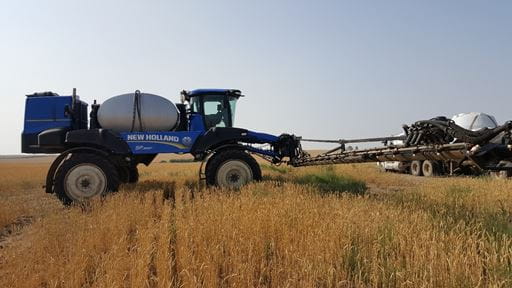Released on June 22, 2023
Seeding is officially complete in Saskatchewan, with only two per cent of acres remaining unseeded in the province. Producers were excited to see rain showers move through the province this week after finishing seeding. While still busy in the field with pesticide application, many are watching as crops emerge and develop.
The majority of crops are in normal stages of development for this time of year. Fall cereals are slightly ahead in development at 31 per cent, while oilseeds are slightly behind in development at 16 per cent. Dry conditions in the west have induced environmental stress in crops and have hastened their development. Alternatively, the east received more moisture during the spring resulting in some localized flooding and has delayed development.
Recorded rain varied from half a mm in Consul to 65 mm of rain received in the Ituna area. Overall, the rain received throughout the province replenished the topsoil moisture conditions. Four per cent of cropland has a surplus of topsoil moisture, 69 per cent is adequate, 24 per cent is short and four per cent is very short.

Hay and pastures also benefitted from this week's precipitation. Three per cent have a surplus of topsoil moisture, 57 per cent is adequate, 33 per cent is short and seven per cent is very short. Livestock water supplies are top of mind this week with 52 per cent of producers anticipating water shortages to occur this summer, while 46 per cent are already facing moderate water shortages. Many are concerned with water quality for their livestock. Producers with these concerns are encouraged to drop-off water samples at their local Ministry of Agriculture regional office for water quality testing.
Producers are currently busy scouting their fields and are spraying herbicides, fungicides and insecticides. There are concerns about grasshopper and gopher pressures.
For many producers, this is still a stressful time of year and producers are encouraged to take all safety precautions in all the work they do. The Farm Stress Line can help by providing support for producers toll free at 1-800-667-4442.
A complete, printable version of the Crop Report is available online at https://www.saskatchewan.ca/crop-report.
Follow the 2023 Crop Report on Twitter at @SKAgriculture.
-30-
For more information, contact:
Mackenzie Hladun
Agriculture
Moose Jaw
Phone: 306-694-3592
Email: mackenzie.hladun@gov.sk.ca

